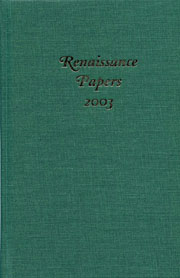Book contents
- Frontmatter
- Contents
- Renaissance Papers
- Homer, Erasmus, and the Problem of Strife
- William Tyndale Among the Demons
- The Printing of “this written book”: G.T. and H.W.'s Editorial Disputes in The Adventures of Master F.J.
- George Puttenham as Comedic Artificer
- Amoret and Scudamour Woo and Wed: Two Courtly Histories and a Stalemate
- Strange Bedfellows: “The Churching of Women” and The Taming of the Shrew
- “Romans, countrymen, and lovers”: Performing Politics, Sovereign Amity and Masculinity in Julius Caesar
- “Rouse Up a Brave Mind”: The Merchant of Venice and Social Uprising in the 1590s
- Revenge Tragedy and Elizabeth Cary's Mariam
- “very worthely sett in printe”: Writing the Virginia Company of London
“Rouse Up a Brave Mind”: The Merchant of Venice and Social Uprising in the 1590s
Published online by Cambridge University Press: 12 September 2012
- Frontmatter
- Contents
- Renaissance Papers
- Homer, Erasmus, and the Problem of Strife
- William Tyndale Among the Demons
- The Printing of “this written book”: G.T. and H.W.'s Editorial Disputes in The Adventures of Master F.J.
- George Puttenham as Comedic Artificer
- Amoret and Scudamour Woo and Wed: Two Courtly Histories and a Stalemate
- Strange Bedfellows: “The Churching of Women” and The Taming of the Shrew
- “Romans, countrymen, and lovers”: Performing Politics, Sovereign Amity and Masculinity in Julius Caesar
- “Rouse Up a Brave Mind”: The Merchant of Venice and Social Uprising in the 1590s
- Revenge Tragedy and Elizabeth Cary's Mariam
- “very worthely sett in printe”: Writing the Virginia Company of London
Summary
In an important early critique of new historicist theory and practice, whose basic insights have by now become fairly widespread, Walter Cohen has famously observed that while new historicists acknowledge that the early modern theater was occasionally subversive and inherently ambivalent their readings of individual plays end up with “a sense of the almost inevitable defeat of the poor, the innocent, and the oppressed.” This interpretive tendency owes theoretically to a vision of society and theater as “organized down to their smallest details for the benefit of those in power”; methodologically, it consists in restricting social and political agency to the elites. Later correctives to this new historicist position, which Patricia Fumerton has recently subsumed under the ingenious rubric of “new new historicism,” have helpfully reclaimed the importance of lower social groups in early modern society and culture, but they have mostly done so at the expense of expressly political concerns, opting instead for a primarily social historicism of everyday life: they have tended to concentrate on extra subtle and mostly apolitical ways in which the common person, in his or her daily activities, “tactically and almost invisibly transforms from within the social structures she or he inhabits.”
- Type
- Chapter
- Information
- Renaissance Papers 2003 , pp. 119 - 148Publisher: Boydell & BrewerPrint publication year: 2004

